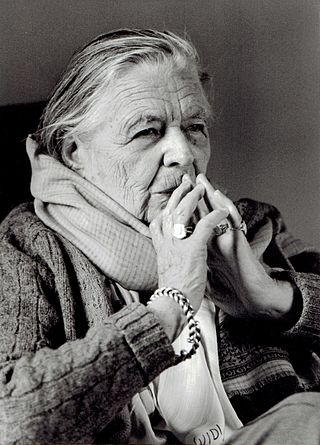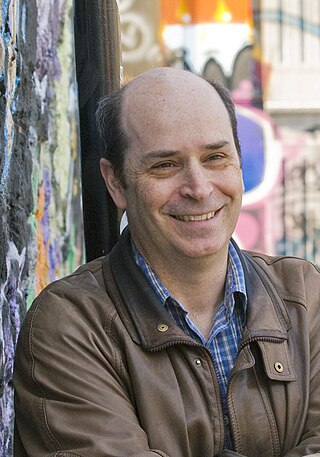Related Research Articles

David Émile Durkheim was a French sociologist. Durkheim formally established the academic discipline of sociology and is commonly cited as one of the principal architects of modern social science, along with both Karl Marx and Max Weber.

Marguerite Yourcenar was a Belgian-born French novelist and essayist who became a US citizen in 1947. Winner of the Prix Femina and the Erasmus Prize, she was the first woman elected to the Académie Française, in 1980. In 1965, she was nominated for the Nobel Prize in Literature.
Life history is an interviewing method used to record autobiographical history from an ordinary person's perspective, often gathered from traditionally marginalized groups. It was begun by anthropologists studying Native American groups around the 1900s, and was taken up by sociologists and other scholars, though its popularity has waxed and waned since. One of the major strengths of the life history method is that it provides a kind of voice from a social milieu that is often overlooked or indeed invisible in intellectual discourse.

René François Nicolas Marie Bazin was a French novelist.

Qualitative research is a type of research that aims to gather and analyse non-numerical (descriptive) data in order to gain an understanding of individuals' social reality, including understanding their attitudes, beliefs, and motivation. This type of research typically involves in-depth interviews, focus groups, or field observations in order to collect data that is rich in detail and context. Qualitative research is often used to explore complex phenomena or to gain insight into people's experiences and perspectives on a particular topic. It is particularly useful when researchers want to understand the meaning that people attach to their experiences or when they want to uncover the underlying reasons for people's behavior. Qualitative methods include ethnography, grounded theory, discourse analysis, and interpretative phenomenological analysis. Qualitative research methods have been used in sociology, anthropology, political science, psychology, communication studies, social work, folklore, educational research, information science and software engineering research.

Sir Patrick Geddes was a Scottish biologist, sociologist, Comtean positivist, geographer, philanthropist and pioneering town planner. He is known for his innovative thinking in the fields of urban planning and sociology. His works contain one of the earliest examples of the 'think globally, act locally' concept in social science.

Henri Lefebvre was a French Marxist philosopher and sociologist, best known for pioneering the critique of everyday life, for introducing the concepts of the right to the city and the production of social space, and for his work on dialectical materialism, alienation, and criticism of Stalinism, existentialism, and structuralism. In his prolific career, Lefebvre wrote more than sixty books and three hundred articles. He founded or took part in the founding of several intellectual and academic journals such as Philosophies, La Revue Marxiste, Arguments, Socialisme ou Barbarie, and Espaces et Sociétés.

Isabelle de Charrière, known as Belle van Zuylen in the Netherlands, née Isabella Agneta Elisabeth van Tuyll van Serooskerken, and [Madame] Isabelle de Charrière elsewhere, was a Dutch and Swiss writer of the Enlightenment who lived the latter half of her life in Colombier, Neuchâtel. She is now best known for her letters and novels, although she also wrote pamphlets, music and plays. She took a keen interest in the society and politics of her age, and her work around the time of the French Revolution is regarded as being of particular interest.

Positivism is a philosophical school that holds that all genuine knowledge is either true by definition or positive –meaning a posteriori facts derived by reason and logic from sensory experience. Other ways of knowing, such as intuition, introspection, or religious faith, are rejected or considered meaningless.
Michel Crozier was a French sociologist and member of the Académie des sciences morales et politiques from 1999 until his death. He also was a fellow of the American Academy of Arts and Sciences, a member of the American Philosophical Society, and a laureate of the Prix Alexis de Tocqueville (1997).

The European Journal of Political Research (EJPR) is a major journal of European political science sponsored by the European Consortium for Political Research (ECPR). It is one of the most highly respected journals in the discipline, and the first journal of the ECPR.

The sociology of literature is a subfield of the sociology of culture. It studies the social production of literature and its social implications. A notable example is Pierre Bourdieu's 1992 Les Règles de L'Art: Genèse et Structure du Champ Littéraire, translated by Susan Emanuel as Rules of Art: Genesis and Structure of the Literary Field (1996).
Olivier Fillieule is a political scientist and sociologist. Fillieule serves as Senior Researcher at CNRS, full-time Professor at the University of Lausanne, and Director of the Institute for Political and International Studies (IEPI).

Paul Thompson is a British sociologist and oral historian. Prior to his recent retirement, he held the position of Research Professor of Sociology at the University of Essex. Thompson is regarded as a pioneer in social science research, particularly due to the development of life stories and oral history within sociology and social history.

Simon Harel is a Canadian intellectual. In addition to being a prolific writer and speaker and an adjunct professor at the Département d'études littéraires of the Université du Québec à Montréal, he is full professor at and Director of the Département de littérature comparée of the University of Montreal.
Arundhati Virmani is an Indian historian. She was a reader in history at Delhi University until 1992. She teaches at the École des Hautes Études en Sciences Sociales in Marseille. She is the co-founder of the Biennale Européenne d'Histoire Locale with Jean Boutier.
Luc de Heusch was a Belgian filmmaker, writer, and anthropologist, professor emeritus at the Université libre de Bruxelles. His 1967 film Thursday We Shall Sing Like Sunday was entered into the 5th Moscow International Film Festival.
Biographical research is a qualitative research approach aligned to the social interpretive paradigm of research. The biographical research is concerned with the reconstruction of life histories and the constitution of meaning based on biographical narratives and documents. The material for analysis consists of interview protocols (memorandums), video recordings, photographs, and a diversity of sources. These documents are evaluated and interpreted according to specific rules and criteria. The starting point for this approach is the understanding of an individual biography in terms of its social constitution. The biographical approach was influenced by the symbolic interactionism, the phenomenological sociology of knowledge, and ethnomethodology. Therefore, biography is understood in terms of a social construct and the reconstruction of biographies can give insight on social processes and figurations, thus helping to bridge the gap between micro-, meso-, and macro- levels of analysis. The biographical approach is particularly important in German sociology. This approach is used in the Social Sciences as well as in Pedagogy and other disciplines. The Research Committee 38 "Biography and Society" of the International Sociological Association (ISA) was created in 1984 and is dedicated "to help develop a better understanding of the relations between individual lives, the social structures and historical processes within which they take shape and which they contribute to shape, and the individual accounts of biographical experience ".
Philippe Corcuff is a French academic, full professor in political science at the Institut d'études politiques de Lyon since October 1992 and member of the CERLIS laboratory since October 2003. Politically committed to the left, with a trajectory that took him from social democracy to pragmatic anarchism, via the ecologists and the New Anti-Capitalist Party, he defines himself as an “anti-globalization and libertarian activist”. He was a columnist for the French satirical weekly Charlie Hebdo from 2001 to 2004.

Michèle Sarde, is a French writer, born in 1939. She taught French literature and culture, together with gender and intercultural studies at Georgetown University, Washington D.C., from 1970 to 2000. She is now a Professor emerita at that university and lives in Chile and France.
References
- ↑ Pioneers of Qualitative Research: Daniel Bertaux. Universities of Essex and Manchester. Accessed August 2013.